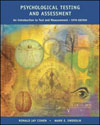|
 |  Psychological Testing and Assessment: An Introduction To Tests and Measurement, 5/e Ronald Jay Cohen
Mark Swerdlik
Test Development
Web Links
Psychological Testing
(http://www.psychologicaltesting.com)
Describes commonly used psychological tests including their development and typical application. |
 |  |  | allthetests.com
(http://www.allthetests.com)
Has a collection of tests that students can take to get a feel for test taking. Includes IQ, career, personality, etc. |
 |  |  | The American Board of Assessment Psychology
(http://www.assessmentPsychologyBoard.org)
The American Board of Assessment Psychology Website contains information such as a listing of assessment specialists who hold the Diplomate (many of the names can be found in the textbook) and useful links to other assessment-related sites. |
 |  |  | The Institute for Applied Psychometrics (IAP)
(http://home.att.net/~gfgc)
The Institute for Applied Psychometrics (IAP) is devoted to the application of psychological, educational, measurement, and statistical concepts and procedures to issues and problems in education and psychology. The goal of the IAP is to serve as a bridge between psychological, psychometric, measurement, and statistical theory and methods and applied practice in psychology and education. The IAP has a special focus on the use of the Cattell-Horn-Carroll Theory of Cognitive Abilities (Cattell-Horn Gf-Gc theory and/or the Carroll tri-stratum theory) in intelligence test development and interpretation. IAP has the following specializations: The application of the Cattell-Horn Carroll Theory of Cognitive Abilities (CHC cognitive theory or Gf-Gc theory of intelligence (Cattell-Horn and Carroll tri-stratum models) to the design and interpretation of intelligence and achievement tests; intelligence and achievement test development and interpretation; psychological and educational measurement (applied psychometrics); application of Rasch scaling (Item Response Theory-IRT) to test development; application of IRT, multivariate statistical, and structural equation model (SEM) methods to educational and psychological issues and problems; research, development, and validation of models of multiple intelligences, personal competence, adaptive behavior, and community adjustment. Many of these topics are included in Chapters 2-17 of this textbook. This site contains much useful information related to these topics as well as many relevant links to other measurement/assessment-related sites. |
 |  |  | The International Test Commission (ITC)
(http://www.intestcom.org)
The International Test Commission (ITC) is an "association of national psychological associations, test commissions, publishers, and other organizations committed to promoting effective testing and assessment policies and to the proper development, evaluation, and uses of
educational and psychological instruments." (ITC Directory, 2001). It was formally established in 1978 by Jean Cardinet and currently has 27 Full Members (national professional psychological associations) and 58 Affiliate Members (other test commissions, publishers, and research organizations involved in testing). Its current membership covers most of the Western and Eastern European Countries and North America, as well as some countries in the Middle and Far East, South America, and Africa. It is registered as a not-for-profit organization and is affiliated to the IA and the IUPsyS. The International Test Commission (ITC) facilitates the exchange of information among members and stimulates their cooperation on problems related to the construction, distribution, and use of psychological tests and other psychodiagnostic tools. To achieve these goals the ITC organizes international meetings and discussions, promotes the publication of relevant information by means of its own and other scientific outlets, and stimulates international cooperation on research projects relevant to a scientifically and ethically sound use of tests. Official Website of the International Testing Commission. Two ITC projects of special interest include the development of guidelines in adapting tests and guidelines on test use. |
|
|



 2002 McGraw-Hill Higher Education
2002 McGraw-Hill Higher Education